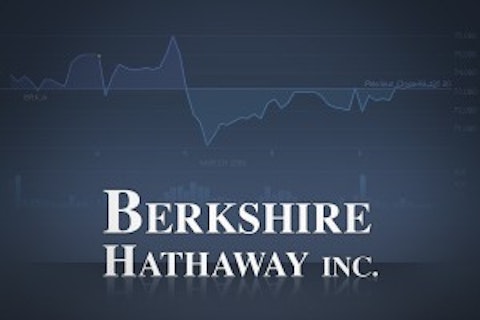Warren Buffett’s Berkshire Hathaway Inc. (NYSE:BRK.A) has been one of the best investing success stories of the past half-century. Under Buffett’s leadership, the textile manufacturer turned insurance company turned investment vehicle has made many people a small fortune (and a few people a very large fortune). With the success of Berkshire, it should come to no surprise that investors are always on the lookout for the next Berkshire Hathaway-like company.

The Specialty Berkshire
Markel Corporation (NYSE:MKL) is similar to Berkshire Hathaway Inc. (NYSE:BRK.A) in many respects, similarities that earned it the nickname “Baby Berkshire.” Markel’s core business is insurance, which has been a strong preforming segment for the company. Much like Berkshire, Markel Corporation (NYSE:MKL) also acquires small companies outside of its insurance core, such as its many food equipment companies, as well as health care and business services companies. Additionally, Markel’s asset management arm has equity investments in many great publicly traded companies, such as No. 1 liquor-maker Diageo plc (ADR) (NYSE:DEO), media conglomerate The Walt Disney Company (NYSE:DIS), and even Berkshire Hathaway itself (which is Markel Corporation (NYSE:MKL)’s largest portfolio position).
Where Markel differs from Berkshire Hathaway Inc. (NYSE:BRK.A) is the insurance niche it has carved out for itself. While Berkshire primarily offers auto insurance and reinsurance, Markel instead offers specialty insurance for children’s summer camps, childcare centers, senior assisted living facilities, health clubs, youth sports leagues and recycling plants (to name only a few such examples). Markel does offer traditional insurance, but its specialty insurance expertise in that niche has given Markel an edge in the market. Many traditional insurance companies will just ignore these difficult-to-insure specialties, leaving Markel with few competitors and the pricing power that comes with that lack of competition.
The Canadian Berkshire
Stop me if this sounds familiar, but POWER CORP OF CANADA (OTCMKTS:PWCDF) is similar to Berkshire Hathaway in many respects. As the name would suggest, the company is based in Canada (Montreal). The former Canadian electric utility is now primarily an insurance company and the closest thing to a Berkshire north of the border. Unlike Markel, POWER CORP OF CANADA (OTCMKTS:PWCDF).’s insurance business is more traditional — primarily offering life insurance through its various subsidiaries operating in Canada, the United States, the United Kingdom and Ireland.
Like the two above mentioned insurers, POWER CORP OF CANADA (OTCMKTS:PWCDF). of Canada also fully owns a number of non-core businesses, primarily media-related. Much like Warren Buffett’s recent acquisitions of many American newspapers, Power Corp. owns a number of French-speaking newspapers. They also own a few online companies, including a Canadian online job recruitment website and a Canadian online advertisement network.
On the asset management side of the company, its subsidiaries have equity positions in a number of French companies. To name some, Power Corp. of Canada has: a 7.5% stake in the world’s No. 2 liquor company Pernod Ricard SA (EPA:RI), a 4% stake in the oil giant Total SA (ADR) (NYSE:TOT), a 5.1% stake in GDF Suez SA (EPA:GSZ) (the world’s largest electric utility) and a 7.2% stake in Suez Environnement Company SA (EPA:SEV), (one of the world’s largest water utilities).
The Non-Insurer Berkshire
Leucadia National Corp. (NYSE:LUK) is very different from Berkshire Hathaway Inc. (NYSE:BRK.A), Markel and Power Corp. of Canada. Unlike the above mentioned three, Leucadia’s core business is not insurance. With the acquisition of the remaining shares of Jefferies Group earlier this year, Leucadia National Corp. (NYSE:LUK)’s core business is investment banking. Warren Buffett himself has generally shied away from that segment of banking after an investment bank Berkshire had a stake in got into trouble with the US government in the early ’90s. The non-insurance, investment bank strategy has thus far worked out very well for Leucadia though, as it has been the best performer of the four companies these past 10 years.
Like everyone else, Leucadia has assets outside of its core investment banking business. Together with Berkshire Hathaway Inc. (NYSE:BRK.A), Leucadia National Corp. (NYSE:LUK) owns 50% of Berkadia Commercial Mortgage. They also own a majority stake in National Beef Packing, as well as stakes in various metal mining operations, oil and natural gas drillers, a timber company, a plastics manufacturer, a biopharma company and some real estate holdings. Include a few other investments and holdings here and there and you get the general idea: another Berkshire-like company.
Bottom Line
Although investors are on the lookout for companies with similar business models to replicate Berkshire Hathaway Inc. (NYSE:BRK.A)’s past (and likely future) success, finding those companies is far easier said than done. If it were that simple to run a company and invest like Warren Buffett, we would all be billionaires! Or at the very least multi-millionaires (I’m not greedy). Not as easy as it sounds though. These three companies however, Markel, Power Corp. of Canada and Leucadia, seem to be the most likely candidates for the position of “the next Berkshire” and might be well worth a closer examination.
The article A Look at the Mini-Berkshires originally appeared on Fool.com is written by Matthew Luke.
Copyright © 1995 – 2013 The Motley Fool, LLC. All rights reserved. The Motley Fool has a disclosure policy.

